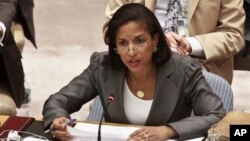UNITED NATIONS —
The United States, Britain and France said Thursday that Iran’s supply of weapons to the Assad regime in Syria is unacceptable and must stop. U.N. ambassadors for the three powers also criticized the Islamic Republic for failing to stop enriching uranium and not seriously engaging with them and others in talks on its suspect nuclear program.
At a meeting on the implementation of sanctions against Iran in the U.N. Security Council, U.S. Ambassador Susan Rice urged the sanctions committee to focus its efforts on what she called Iran’s “long-standing and well-documented” smuggling of weapons to extremist groups worldwide.
“U.N. sanctions prevent Iran from exporting all arms and related material to any country. Iran’s exports to the murderous Assad regime in Syria are of particular concern. As the panel of experts has concluded, Syria is now the “central party to illicit Iranian arms transfers,” she said.
She urged regional states to intensify their efforts to “deny, inspect and seize” illegal Iranian shipments, in line with U.N. resolutions.
A commander of Iran's Revolutionary Guards said this week that the force was providing non-military assistance in Syria and Lebanon. Iran's Foreign Ministry denied the remarks a day later.
The Reuters news agency reported that Iran has been using civilian aircraft to fly military personnel and weapons across Iraqi airspace to Syria.
French Ambassador Gérard Araud said Thursday that Iran has violated a U.N.-imposed arms embargo in a bid to help the Syrian authorities.
“While the Damascus regime has been massacring its own people for more than a year now, it is increasingly urgent to strictly apply sanctions and in doing so, stop Iran from providing the Assad regime weapons which allow it to kill its own people,” Gerard said.
Britain’s Ambassador Mark Lyall Grant said the supply of weaponry is “unacceptable and must stop.”
The three powers also criticized Iran for its continued failure to implement existing council resolutions to stop enriching uranium and answer questions about its suspect nuclear program. Iran says its nuclear ambitions are for peaceful purposes.
The ambassadors said their governments are committed to a negotiated and peaceful resolution of the issue, but that Iran must seriously engage, otherwise talks cannot continue indefinitely.
Next Thursday, on the sidelines of the U.N. General Assembly annual debate, the five permanent members of the Security Council - Britain, China, France, Russia and the United States - plus Germany, will meet at the political directors level to discuss how to move forward on the Iranian nuclear issue.
Their meeting follows an August 30 report from the International Atomic Energy Agency IAEA that found Tehran has not cooperated with the Agency in resolving outstanding issues surrounding the nature of its nuclear program.
Iran’s international isolation is increasing, following a vote last week by the IAEA board of governors, which included support from Russia and China, censuring Tehran for its failure to comply with international demands.
At a meeting on the implementation of sanctions against Iran in the U.N. Security Council, U.S. Ambassador Susan Rice urged the sanctions committee to focus its efforts on what she called Iran’s “long-standing and well-documented” smuggling of weapons to extremist groups worldwide.
“U.N. sanctions prevent Iran from exporting all arms and related material to any country. Iran’s exports to the murderous Assad regime in Syria are of particular concern. As the panel of experts has concluded, Syria is now the “central party to illicit Iranian arms transfers,” she said.
She urged regional states to intensify their efforts to “deny, inspect and seize” illegal Iranian shipments, in line with U.N. resolutions.
A commander of Iran's Revolutionary Guards said this week that the force was providing non-military assistance in Syria and Lebanon. Iran's Foreign Ministry denied the remarks a day later.
The Reuters news agency reported that Iran has been using civilian aircraft to fly military personnel and weapons across Iraqi airspace to Syria.
French Ambassador Gérard Araud said Thursday that Iran has violated a U.N.-imposed arms embargo in a bid to help the Syrian authorities.
“While the Damascus regime has been massacring its own people for more than a year now, it is increasingly urgent to strictly apply sanctions and in doing so, stop Iran from providing the Assad regime weapons which allow it to kill its own people,” Gerard said.
Britain’s Ambassador Mark Lyall Grant said the supply of weaponry is “unacceptable and must stop.”
The three powers also criticized Iran for its continued failure to implement existing council resolutions to stop enriching uranium and answer questions about its suspect nuclear program. Iran says its nuclear ambitions are for peaceful purposes.
The ambassadors said their governments are committed to a negotiated and peaceful resolution of the issue, but that Iran must seriously engage, otherwise talks cannot continue indefinitely.
Next Thursday, on the sidelines of the U.N. General Assembly annual debate, the five permanent members of the Security Council - Britain, China, France, Russia and the United States - plus Germany, will meet at the political directors level to discuss how to move forward on the Iranian nuclear issue.
Their meeting follows an August 30 report from the International Atomic Energy Agency IAEA that found Tehran has not cooperated with the Agency in resolving outstanding issues surrounding the nature of its nuclear program.
Iran’s international isolation is increasing, following a vote last week by the IAEA board of governors, which included support from Russia and China, censuring Tehran for its failure to comply with international demands.




